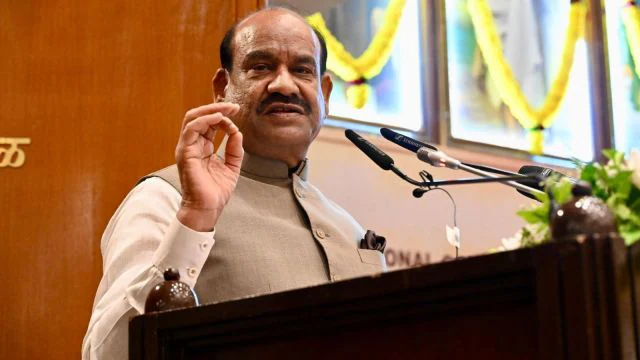



Lok Sabha Speaker Om Birla inaugurated the Estimates Committee's platinum jubilee conference, celebrating its 75-year history. He called for enhanced fiscal oversight using technology and citizen engagement to ensure transparency and accountability. Leaders praised the committee as a vital democratic tool that shapes government functioning and promotes inclusive development.

Copyright infringement not intended
Picture Courtesy: INDIAN EXPRESS
The Parliamentary Estimates Committee marked its 75th anniversary.
The committee was first established in 1950, following the recommendation of the then-Finance Minister, John Mathai.
It consists of 30 members, all of whom are from the Lok Sabha. Rajya Sabha has no representation in this committee.
The term of office for the members of the committee is one year.
Members are elected annually based on the principle of proportional representation, ensuring representation from various political parties.
The Chairperson of the committee is appointed by the Lok Sabha Speaker from amongst its members and generally belongs to the ruling party.
A Minister cannot be elected as a member of the Committee and if a member after selection to the Committee is appointed a Minister, the member ceases to be a Member of the Committee from the date of such appointment.
The primary function of the Estimates Committee is to scrutinize the government's budget estimates after they are presented to Parliament.
Reporting on Economies =>To examine and report on potential economies, improvements in organization, and administrative reforms that can be affected in government expenditure.
Suggesting Alternative Policies => To suggest alternative policies to bring about greater efficiency and economy in administration.
Verifying Expenditure => To examine whether the money allocated is well within the limits of the policy implied in the estimates.
Recommending Budget Format => To suggest the form in which the estimates should be presented to Parliament.
Subject Selection => After its constitution each year, the committee selects specific ministries, departments, or public bodies for examination. It can also investigate matters of special interest referred to it by the Speaker or the House.
Detailed Examination => The committee often forms smaller sub-committees or study groups to conduct in-depth analysis of the chosen subjects.
Reporting => Its findings and recommendations are compiled into reports and presented to the Lok Sabha.
Action Taken => The concerned ministry or department is required to act upon the committee's recommendations, within six months. The government's response is then examined by the committee, which presents an "Action Taken Report" to the Lok Sabha.
Fiscal Discipline => It holds the government accountable for its spending, compelling transparency and discipline in administration.
Shaping National Policy => Over its 75-year history, the committee has submitted over 1,000 reports that have shaped key national policies in sectors like health, education, and defense.
High Acceptance Rate => Although its recommendations are advisory, they hold significant weight. According to Lok Sabha Speaker Om Birla, the government has accepted over 90% of the committee's recommendations. A recent example of its influence is its report on the Electric Vehicle policy, which led to tax rebates and road tax waivers.
Must Read Articles:
Source:
|
PRACTICE QUESTION Q. A minister cannot be elected as a member of the Estimates Committee. What is the principle behind this rule? A. The principle of collective responsibility. B. The principle of separation of powers. C. The convention that ministers should focus on policy-making and not on the details of financial scrutiny. D. The rule that a member of one house cannot be part of a committee exclusive to the other house. Answer: B Explanation: The rule exists to enforce a functional separation of powers. While the parliamentary system fuses the executive and legislature (since ministers must be members of Parliament), their functions are kept distinct for the purpose of accountability. A minister is a part of the executive branch of the government. If a minister were allowed to be a member of the committee, it would create a conflict of interest. The process of scrutiny would lose all its meaning, integrity, and objectivity. |




© 2026 iasgyan. All right reserved